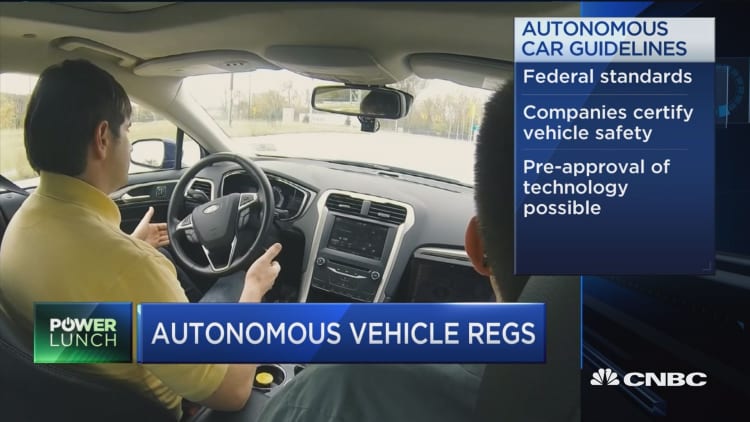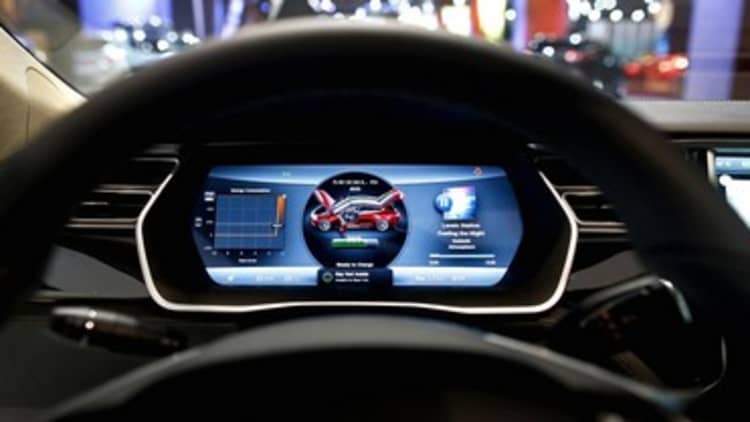It's hard to imagine that Apple would know much about an industry that companies like Ford have spent generations pioneering, but experts said Apple has quite a bit to work with compared to the hottest start-ups in the automotive sector.
Apple has never openly confirmed it is working on a car, though CEO Tim Cook has said he thinks it is possible to envision an automobile industry supply chain much like the electronics industry.
The long-floating rumor recently gained more traction after a report that Apple was considering the purchase of luxury carmaker McLaren, which denies it's in talks with Apple. Lit Motors, which declined to comment to CNBC, was also reported to be in discussions with Apple, according to The New York Times.
It may seem counterintuitive for the iPhone maker to create a car, despite having resources and a powerful brand and aesthetic. But while steel and gasoline have become commoditized, a car's new essential ingredients, like cybersecurity and automation, will give technology companies like Apple an edge, said Brook Porter, partner at Kleiner Perkins Caufield & Byers Green Growth Fund, which invests in the future of transportation.
If there was ever a time for someone to make a car, it's absolutely now.Brook Porterpartner at Kleiner Perkins Caufield & Byers Green Growth Fund
Porter said that five years from now, he expects that the latest cars will be electric, connected, shareable and autonomous, areas where Apple has some of the best opportunities.
One consumer electronics company has already made the leap: LeEco, a Chinese tech giant that makes smartphones, cloud, streaming, virtual reality headsets and now a car with Aston Martin. Once upon a time, the transition from PayPal co-founder to carmaker could have been questionable for Elon Musk, co-founder and CEO of Tesla, notes Porter.
"But he used great engineering and design theory," Porter said of Musk. "Because if there was ever a time for someone to make a car, it's absolutely now."
Big advancements in big data
One reason that self-driving technology is suddenly heading mainstream is that one of the preferred sensors, called Lidar, is expected to get considerably cheaper over the next five years, said technology investor Michael Dempsey.
Lidars, which can cost $30,000 today, may no longer be out of reach for an average consumer vehicle in the near future, Dempsey said.
Technology companies, including Apple, have made crunching large data sets much easier thanks to cloud computing, graphics processing, artificial intelligence and machine learning. And being the first company to get large swaths of driving data, like 3-D maps or braking behavior, is key to bringing a successful self-driving car to market, Dempsey said.
"A lot of it comes down to training data," Dempsey said. "It's the companies that have been doing it the longest [that] will be able to understand the world better."

If you've carried an iPhone in your pocket for any amount of time, you know Apple knows a whole lot about you, including where you like to go and when. The company has strict policies about not storing information on user locations, but it presumably still has a lot of information it can leverage.
It has recently been granted patents for a tile interface for upcoming locations on a map, location awareness between two mobile phones and a way to model crowds of people using mobile devices. Though it has faced setbacks, Apple's location technology has helped make ride-sharing services such as Uber and Lyft possible.
Still, Dempsey said, there are few substitutes to having actual sensors in a car, even though more experimental technologies do exist to simulate real driving. Real driving is best to teach cars about those "one in a million" situations drivers face on the road, Dempsey said.
Google, Uber and Tesla are the most well-known companies that have been testing autonomous driving technology and collecting driver data, Dempsey said, although he thinks Apple may just be keeping its testing more close to the vest.
Batteries are getting cheaper
"The past 10 years have seen an unprecedented growth of investment in clean energy technology," said Yingchao Yu, founder and CEO for battery component start-up Lionano. "Many people immediately think of energy sources such as wind and solar, or final uses such as electric vehicles, but this also means that energy storage is booming."
Yu said in five years, he expects electric vehicles will be the most convenient option for car consumers. The creator of the lightning port, Apple is no stranger to battery technology, although there are differences, said Hector Abruna, director of the Energy Materials Center at Cornell.
Back in the heyday of desktop computers, consumer electronics used cylindrical batteries. That's the type of battery that Tesla likely uses now, though they are a much more powerful variety, Abruna said.
Today, most phones and electronic devices (likely including Apple's) use prismatic batteries, that have a flat, layered design. That type of battery is also used by many traditional car companies, according to Abruna.
Levy Raiz, a partner at venture capital firm Flint Capital, points to start-ups like StoreDot, which works on batteries for both smartphones and cars, as a potential parallel for someone like Apple.
Adapting the charge time and lifetime of batteries is still a major challenge, Abruna said. But Apple has made some progress in this arena, if legal documents are any indication. A lawsuit filed last year against Apple ties employees there to A123 Systems, which makes car battery solutions.
Cybersecurity and cloud
Cars have already started becoming more "connected," and many have Wi-Fi connections, but unfortunately, cybersecurity is sometimes an afterthought of the years-long design process, said Jason Cook, who works at preeminent car cybersecurity division of BT Global Services.
Now companies such as Microsoft are putting more advanced cloud technology behind the wheel. The company recently announced a partnership with Renault-Nissan Alliance to essentially let users "log in" to Nissan vehicles to access personalized settings. The technology will let drivers monitor their car from anywhere, use automatic payments for highway tolls, and get automatic software updates.

Such technology provides incredible convenience, Jason Cook said, but also means that much more of your personal data would be available to hackers through your car. If the car is seen as a brand new "threat surface" for hackers, Cook said, users might buy cars based as much on their trust of the company's software as its hardware.
That could be an important selling point for companies such as Apple and Microsoft, who have taken a strong stance on topics like encryption.
Microsoft also announced this month a way to identify drivers of Uber cars through facial recognition. It would not be surprising to see Apple use its own facial recognition technology from its cameras for security, Jason Cook said, in addition to biometric options like fingerprint scanning, and near field technology, where your phone or watch unlocked your vehicle, he said.
The Apple way
Apple is known for its beautiful products, Cook of BT said, and it makes sense for Apple to bring that aesthetic to cars as the digital revolution hits a turning point.
With products like CarPlay, Apple has already invested in owning another "screen" where users could one day be entertained and productive as their car does the bulk of the driving automatically, said Porter.
"Apple has a lot to give on the consumer interface side," Raiz said. "They know how to make products stupid simple for users. That's exactly the direction of the industry in the next 10 to 15 years."
Apple will definitely have to invest and step up to compete with entrenched, focused players, Raiz said, but he doesn't count them out.
"Why is it natural? Because currently cars are perceived as the industry due for innovation and disruption," Raiz said. "And Apple is perceived as a player that knows how to bring innovation and disruption into consumer electronics. Someday cars will just be one one more device, not a big thing like owning a house like it was 30 or 40 years ago."


